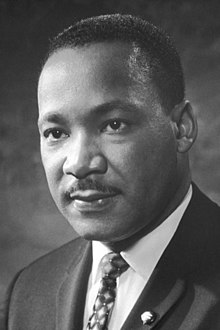The evils of capitalism are as evil as the evils of militarism and racism. The problems of racial injustice and economic injustice cannot be solved without a radical redistribution of political and economic power.
--Martin Luther King (1929 –1968)
(81:6.20) 7. Effectiveness of mechanical devices. The progress of civilization is directly related to the development and possession of tools, machines, and channels of distribution. Improved tools, ingenious and efficient machines, determine the survival of contending groups in the arena of advancing civilization.
(81:6.38) High civilizations are born of the sagacious correlation of material wealth, intellectual greatness, moral worth, social cleverness, and cosmic insight.
(132:5.20) If you chance to secure wealth by flights of genius, if your riches are derived from the rewards of inventive endowment, do not lay claim to an unfair portion of such rewards. The genius owes something to both his ancestors and his progeny; likewise is he under obligation to the race, nation, and circumstances of his inventive discoveries; he should also remember that it was as man among men that he labored and wrought out his inventions. It would be equally unjust to deprive the genius of all his increment of wealth. And it will ever be impossible for men to establish rules and regulations applicable equally to all these problems of the equitable distribution of wealth.
(132:5.21) Except for the just and legitimate fees earned in administration, no man should lay personal claim to that wealth which time and chance may cause to fall into his hands. Accidental riches should be regarded somewhat in the light of a trust to be expended for the benefit of one's social or economic group. The possessors of such wealth should be accorded the major voice in the determination of the wise and effective distribution of such unearned resources. Civilized man will not always look upon all that he controls as his personal and private possession.
(140:8.15) 4. Economic attitude. Jesus worked, lived, and traded in the world as he found it. He was not an economic reformer, although he did frequently call attention to the injustice of the unequal distribution of wealth. But he did not offer any suggestions by way of remedy. He made it plain to the three that, while his apostles were not to hold property, he was not preaching against wealth and property, merely its unequal and unfair distribution. He recognized the need for social justice and industrial fairness, but he offered no rules for their attainment.
(195:10.20) Christianity suffers under a great handicap because it has become identified in the minds of all the world as a part of the social system, the industrial life, and the moral standards of Western civilization; and thus has Christianity unwittingly seemed to sponsor a society which staggers under the guilt of tolerating science without idealism, politics without principles, wealth without work, pleasure without restraint, knowledge without character, power without conscience, and industry without morality.
Martin Luther King Jr. (born Michael King Jr.; January 15, 1929 – April 4, 1968) was an American Baptist minister, activist, and political philosopher who was one of the most prominent leaders in the civil rights movement from 1955 until his assassination in 1968. King advanced civil rights for people of color in the United States through the use of nonviolent resistance and nonviolent civil disobedience against Jim Crow laws and other forms of legalized discrimination.
A black church leader, King participated in and led marches for the right to vote, desegregation, labor rights, and other civil rights. He oversaw the 1955 Montgomery bus boycott and later became the first president of the Southern Christian Leadership Conference (SCLC). As president of the SCLC, he led the unsuccessful Albany Movement in Albany, Georgia, and helped organize some of the nonviolent 1963 protests in Birmingham, Alabama. King was one of the leaders of the 1963 March on Washington, where he delivered his "I Have a Dream" speech on the steps of the Lincoln Memorial, and helped organize two of the three Selma to Montgomery marches during the 1965 Selma voting rights movement. The civil rights movement achieved pivotal legislative gains in the Civil Rights Act of 1964, the Voting Rights Act of 1965, and the Fair Housing Act of 1968. There were several dramatic standoffs with segregationist authorities, who often responded violently.
King was jailed several times. Federal Bureau of Investigation (FBI) director J. Edgar Hoover considered King a radical and made him an object of the FBI's COINTELPRO from 1963 forward. FBI agents investigated him for possible communist ties, spied on his personal life, and secretly recorded him. In 1964, the FBI mailed King a threatening anonymous letter, which he interpreted as an attempt to make him commit suicide.[3] On October 14, 1964, King won the Nobel Peace Prize for combating racial inequality through nonviolent resistance. In his final years, he expanded his focus to include opposition towards poverty and the Vietnam War.
In 1968, King was planning a national occupation of Washington, D.C., to be called the Poor People's Campaign, when he was assassinated on April 4 in Memphis, Tennessee. James Earl Ray, a fugitive from the Missouri State Penitentiary, was convicted of the assassination, though the King family believes he was a scapegoat. After a 1999 wrongful death lawsuit ruling named unspecified "government agencies" among the co-conspirators,[4] a Department of Justice investigation found no evidence of a conspiracy.[5] The assassination remains the subject of conspiracy theories. King's death was followed by national mourning, as well as anger leading to riots in many U.S. cities. King was posthumously awarded the Presidential Medal of Freedom in 1977 and the Congressional Gold Medal in 2003. Martin Luther King Jr. Day was established as a holiday in cities and states throughout the United States beginning in 1971; the federal holiday was first observed in 1986. The Martin Luther King Jr. Memorial on the National Mall in Washington, D.C., was dedicated in 2011.
